中考英语重点语法全归纳:4种常考句型
2023中考英语重点知识归纳笔记

一.英语语法重点与难点1、as…as…结构:你和汤姆是一样好的孩子。
You’re a boy as good as Tom.=You’re as good a boy as Tom.2、(1)too…to与so…that sb. can’t…的句型转换:前者为简单句,主语只有一个,而后者为复合句,主语有两个,试比较:The man was too angry to be able to speak.The man was so angry that he wasn’t able to speak.(2) too…to…与not enough to句型的转换:He is too young to get married.=He is not old enough to get married.The book is too difficult for me to read.=The book is not easy enough for me to read.3、形容词原级表示比较级含义:约翰不象迈克那么苯。
John is not so stupid as Mike.John is less stupid than Mike.John is cleverer than Mike.4、用比较级表示最高级:约翰是班里最高的男生。
John is taller than any other boy in the class.John is the tallest boy in the class.5、the more….. the more….表示“越……越……”:The more books you read, the wider your knowledge is.The more food you eat, the fatter you are.6、more and more….表示“越来……越……”:More and more students realized the importance of a foreign language.Our country is getting stronger and stronger.二.中考考点—词组1. after, in 这两个介词都可以表示“……(时间)以后”的意思after 以过去为起点,表示过去一段时间之后,常用于过去时态的句子中?如:She went after three days. 她是三天以后走的in 以现在为起点,表将来一段时间以后,常用于将来时态的句子中如:She will go in three days. 她三天以后要走2. how long, how often, how soonhow long指多长时间,主要用来对一段时间(如three days, four weeks 等)提问?如:How long ago was it? 这是多久前的事了?how often指每隔多久,主要用来对频率副词或状语(如once a week等)提问?如:—How often does he come here? —Once a month. 他(每隔)多久来一次?每月一次。
初中英语重点句型短语中考必背
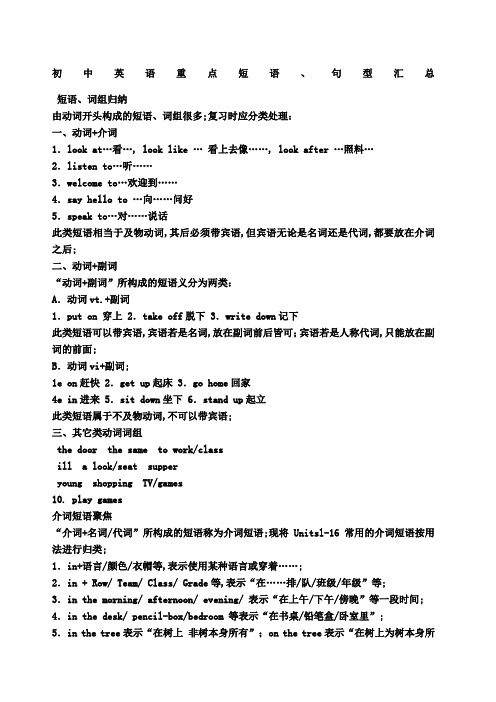
初中英语重点短语、句型汇总短语、词组归纳由动词开头构成的短语、词组很多;复习时应分类处理:一、动词+介词1.look at…看…, look like … 看上去像……, look after …照料…2.listen to…听……3.welcome to…欢迎到……4.say hello to …向……问好5.speak to…对……说话此类短语相当于及物动词,其后必须带宾语,但宾语无论是名词还是代词,都要放在介词之后;二、动词+副词“动词+副词”所构成的短语义分为两类:A.动词vt.+副词1.put on 穿上 2.take off脱下 3.write down记下此类短语可以带宾语,宾语若是名词,放在副词前后皆可;宾语若是人称代词,只能放在副词的前面;B.动词vi+副词;1e on赶快 2.get up起床 3.go home回家4e in进来 5.sit down坐下 6.stand up起立此类短语属于不及物动词,不可以带宾语;三、其它类动词词组the door the same to work/classill a look/seat supperyoung shopping TV/games10. play games介词短语聚焦“介词+名词/代词”所构成的短语称为介词短语;现将Unitsl-16常用的介词短语按用法进行归类;1.in+语言/颜色/衣帽等,表示使用某种语言或穿着……;2.in + Row/ Team/ Class/ Grade等,表示“在……排/队/班级/年级”等;3.in the morning/ afternoon/ evening/ 表示“在上午/下午/傍晚”等一段时间; 4.in the desk/ pencil-box/bedroom 等表示“在书桌/铅笔盒/卧室里”;5.in the tree表示“在树上非树本身所有”;on the tree表示“在树上为树本身所有”;6.in the wall表示“在墙上凹陷进去”;on the wall表示“在墙上指墙的表面”; 7.at work在工作/at school上学/at home在家应注意此类短语中无the;8.at + 时刻表示钟点;9.like this/that表示方式,意为“像……这/那样”;10.of短语表示所属关系;11.behind/ beside/ near/ under+ 名词等,表示方位、处所;12.from与to多表示方向,前者意为“从……”,后者意为“到……”;另外,以下这些短语也必须掌握;如:on duty, after breakfast, at night, at the door, in the middle, in the sky, on one’s bike等;重点句型大回放1.I th ink…意为“我认为……”,是对某人或某事的看法或态度的一种句型;其否定式常用I don’t think…,2.give sth. to sb./ give sb. sth. 意为“把……给……”,动词give之后可接双宾语,可用这两种句型;若指物的宾语是人称代词时,则只能用give it/ them to sb. 3.take sb./ sth. to…意为“把……送带到……”,后常接地点,也可接人; 4.One…, the other…/One is…and one is…意为“一个是……;另一个是……”,必须是两者中;5.Let sb. do sth. 意为“让某人做某事”,人后应用不带to的动词不定式,其否定式为Don’t let sb,do sth.,或Let sb. not do sth. 另外,Let’s 与Let us的含义不完全相同,前者包括听者在内,后者不包括听者在内,6.help sb. to do sth./help sb. with sth.意为“帮助某人做某事”,前者用不定式作宾补,后者用介词短语作宾补,二者可以互换.7.What about…/How about…意为“……怎么样”是用来询问或征求对方的观点、意见、看法等;about为介词,其后须接名词、代词或V-ing等形式;8.It’s time to do…/ It’s time for sth. 意为“该做……的时间了”,其中to 后须接原形动词,for后可接名词或V-ing形式;9.like to do sth./like doing sth.意为“喜欢做某事”, 前一种句型侧重具体的一次性的动作;后一种句型侧重习惯性的动作,10.ask sb.not to do sth. 意为“让某人不要做某事”,其中ask sb.后应接动词不定式,11.show sb. sth. / show sth. to do. 意为“把某物给某人看”,该句型的用法同前面第2点;12.introduce sb. to sb. 意为“把某人介绍给另一人”;introduce to sb.则是“向某人作介绍”;重点短语快速复习of 各种各样的2. either…or…或者……或者……,不是……就是……3. neither…nor…既不……也不……4. Chinese tea without, anything in it 中国清茶5. take a seat 就坐6. home cooking 家常做法7. be famous for 因……而著名8. on ones way to在……途中9. be sick/ill in hospital生病住院10. at the end of在……的尽头,在……的末尾11. wait for 等待12. in time 及时13. make one’s way to…往……艰难地走去14. just then 正在那时15. first of all 首先,第一16. go wrong 走错路17. be/get lost 迷路18. make a noise 吵闹,喧哗19. get on 上车20. get off 下车21. stand in line 站队22. waiting room 候诊室,候车室23. at the head of……在……的前头24. laugh at 嘲笑25. throw about 乱丢,抛散26. in fact 实际上27. at midnight 在半夜28. have a good time=enjoy oneself玩得愉快29. quarrel with sb. 和某人吵架30. take one’s temperature 给某人体温31. have/get a pain in…某处疼痛32. have a headache 头痛33. as soon as… 一……就……34. feel like doing sth. 想要干某事35. stop…from doing sth. 阻止……干某事36. fall asleep 入睡37. again and again再三地,反复地38. wake up 醒来,叫醒39. instead of 代替40. look over 检查41. take exercise运动42. had betternot do sth. 最好不要干某事43. at the weekend 在周末44. on time 按时45. out of从……向外46. all by oneself 独立,单独47. lots of=a lot of 许多48. no longer/more=not…any longer/more 不再49. get back 回来,取回50. sooner or later迟早51. run away 逃跑52. eat up 吃光,吃完53. run after 追赶54. take sth. with sb. 某人随身带着某物55. takegood care of…=look after…well 好好照顾,照料56. think of 考虑到,想起57. keep a diary 坚持写日记58. leave one by oneself 把某人单独留下59. harder and harder 越来越厉害60. turn on打开电灯、收音机、煤气等61. turn off 关重温重点句型1.So + be/助动词/情牵动词/主语.前面陈述的肯定情况也适于另一人物时,常用到这种倒装结构,表示“另一人物也如此;”前面陈述的否定情况也适于另一人物时,常用“Neither/ Nor + be/助动词/情态动词+主语.”这种倒装结构;注意:“So+主语+be/助动词/情态动词.”这一句型常用于表示赞同,进一步肯定对方的看法,表示“的确如此;”“是呀;”2.Turn right/left at the first/second/…crossing.这一指路的句型意为“在第一/二/……个十字路口向右/左拐;”相当于Take the first /second/…turning on theright/left.3.It takes sb.some time to do sth.此句型表示“干某事花了某人一段时间;”其中的it是形式主语,后面的动词不定式短语才是真正的主语.4.…think/find + it + adj. + to do sth.此句型中的it是形式宾语,不可用其它代词替代,形容词作宾语的补足语,后面的动词不定式短语才是真正的宾语;5.What’s wrong with…此句型相当于What’s the matter/ trouble with…后跟某物作宾语时,意为“某物出什么毛病了”后跟某人作宾语时,意为“某人怎么了”6.too…to…在so…that…复合句中,that后的句子是否定句时,常与简单句too…to…太……而不能……进行句型转换;在so…that…复合句中,that后的句子是肯定句时,常与简单句…enough to…进行句型转换.7.Sorry to hear that.全句应为I’m sorry to hear that. 意为“听到此事我很难过遗憾;”常用于对别人的不幸表示同情、遗憾之意;重点句型、词组大盘点1. She used to be a Chinese teacher. 她过去是一位汉语老师;用法 used to + 动词原形,表示过去经常性的动作或存在的状态,含有现在不再如此之意;搭配 used to do的否定式可以是usedn’t to do或didn’t use to do.比较 used to do sth. 过去常做某事;be/ get used to doing sth. 习惯于做某事;be used to do sth. 被用来做某事;2.…return it sooner or later.……迟早要将它归还;用法 lsooner or later意为“迟早”、“早晚”;2return此处用作及物动词,意为“归还”,相当于give back.拓展return还可用作不及物动词,意为“返回”,相当于go back或come back; matter what the weather is like…无论天气…… 用法no matter what 相当于whatever,其意为“无论什么”,引导状语从句; 拓展类似no matter what的表达方式还有: no matter when无论什么时候 nbsp; nbsp;nbsp;no matter where无论什么地方 no matter who无论谁 no matter how 无论怎么样 4. A young man practised speakingEnglish with Mr. Green. 一位年经人与格林先生练习讲英语; 用法practise doing sth. 表示“实践、练习做某事”; 拓展practice名词,“实践”、“实施”、“练习”;put a plan into practice实行某计划; 5. He encouraged everyone to take part in protecting our lakes, rivers, seas and oceans. 他鼓励大家参加保护我们的湖泊、河流和海洋的活动; 用法1encourage用作动词,意思是“鼓励”、“支持”; 2take part in“参加”,常表示参加活动; 3protect 是动词,表示“防御”、“保护”; 搭配1encourage sb. in sth.在某事上鼓励或支持某人 nbsp;encourage sb. to do sth.鼓励某人干某事 2protect sh. from sth.使某人不受某事侵袭或伤害 6. …to warn people about sharks in the water. ……警告人们当心水里的鲨鱼; 用法 warn用作动词,意思是“警告”、“警戒”; 搭配1warn sb.+ that从句 2warn sb. of sth. 警告某人某事 3warn sb. to do sth.告诫某人做某事 4warn sb. againstdoing sth.告诫某人当心某事/不要做某事重点句型、词组大盘点 1. She used to be a Chinese teacher. 她过去是一位汉语老师; 用法 used to + 动词原形,表示过去经常性的动作或存在的状态,含有现在不再如此之意; 搭配 used to do的否定式可以是usedn’t to do或didn’t use to do. 比较 used to do sth. 过去常做某事;be/ get used to doing sth. 习惯于做某事;be used to do sth. 被用来做某事; ……短语总结1.It’s time for sth. 该到做某事的时间了.2.It’s time to do sth.It’s time for sb. to do sth 该到某人做某事的时间了.3. 2. can’t wait to do sth. 迫不及待地要求做某事.4. 3. ask tellsb. not to do sth . 请告诉某人不做某事.5. 4. make/let sb. to do sth. 让某人做某事.6. 5. hear/see/sb. do sth 听见/看见某人做某事.7. 6. had betternot do sth 最好不做某事.8.7. It’s better to do sth最好做某事9.8. It’s best to do sth最好做某事10.9. enjoy 喜欢做某事11.10. finish 结束做某事12.11. keep 继续做某事13.12. keep on doing sth. 继续做某事14.13. carry on 继续做某事15.14. go on 继续做某事16.15. feel like 喜欢做某事17.16. stop to do sth 与stop doing sth 停下来去做某事与停止做某事.18.17. forget/remember to do 与 forget/remember doing sth.忘记/记得去做某事与忘记/记得曾经做过事.19.18. keepprecent,stopsb. from doing sth阻止/防止/阻栏栽人做某事20.19. prefer….to ……喜欢…..胜过……21.20. prefer to do sth. rather than do ath.宁愿做某事,而不原做某事.22.21. used to do sth.过去常常做某事.23.22. What’s wong with…… …..出了问题事24.23. have not hing to do with….. 与…..无关25.24. be busy doing sth . 在忙于做某事26.25. too…..to….. 太……以致知于不……27.26. so ……that ….. 如此….. 以致知于不……28.27. such…..that…… 如此….. 以致知于不……29.28. It take sb. some time to do sth .某人做某事用了一些时间.30.29. spend …..on sth.doing sth.花钱/时间做某事.31.30. pay…..f or sth.花费钱买某物.32.31. What /how about…… …….怎么样好吗33.32. would like to do sth .想要/愿意做某事..34.33. I don’t think that我认为……不…..35.34. Why not do sth. Why don’t you do sth .为什么不做某事呢36.35. What do you mean by….你….是什么意思37.36. What do you think of …..How do you like ….你认为….怎么样 37. Mikeenjoys collecting stamps . So do I.迈克喜欢集邮.我也也喜欢. 38. The more, the better . 越多越剧好. 39. Thanks for doing sth.谢谢你做了某事. 40. It is said that….. 据说……1 see 、hear 、notice 、find 、feel 、listen to 、 look at 感官动词+ doeg :I like watching monkeys jump.2 比较级 and 比较级表示越来越怎么样3 a piece of cake =easy 小菜一碟容易4 agree with sb 赞成某人5 all kinds of 各种各样 a kind of 一样6 all over the world = the whole world 整个世界7 along with 同……一道,伴随……eg : I will go along with you 我将和你一起去The students planted trees along with their teachers 学生同老师们一起种树8 As soon as 一怎么样就怎么样9 as you can see 你是知道的10 ask for ……求助向…要…直接接想要的东西 eg : ask you for my book 11 ask sb for sth 向某人什么 12 ask sb to do sth 询问某人某事 ask sb not to do 叫某人不要做某事13 at the age of 在……岁时eg:I am sixteen I am at the age of sixteen14 at the beginning of …………的起初;……的开始15 at the end of +地点/+时间最后;尽头;末尾 eg : At the end of the day16 at this time of year 在每年的这个时候17 be /feel confident of sth /that clause +从句感觉/对什么有信心,自信eg : I am / feel confident of my spoken English.I feel that I can pass the test. 18 be + doing 表:1 现在进行时 2 将来时 19 be able to + v 原 = can + v 原能够……eg : She is able to sing She can sing20 be able to do sth 能够干什么 eg :she is able to sing21 be afraid to do of sth 恐惧,害怕…… eg : I'm afraed to go out at night I'm afraid of dog22 be allowed to do 被允许做什么eg:I'm allowed to watch TV.我被允许看电视I should be allowed to watch TV.我应该被允许看电视23 be angry with sb 生某人的气 eg : Don't be angry with me24 be angry withat sb for doing sth 为什么而生某人的气25 be as…原级…as和什么一样 eg : She is as tall as me 她和我一样高26 be ashamed to27 be away from 远离28 be away from 从……离开29 be bad for 对什么有害 eg : Reading books in the sun is bad for your eyes 在太阳下看书对你的眼睛不好30 be born 出生于31 be busy doing sth 忙于做什么事 be busy with sth 忙于……32 be careful 当心;小心33 be different from……和什么不一样34 be famous for 以……著名35 be friendly to sb 对某人友好36 be from = come from 来自eg :He is from Bejing. He comes from Bejing.Is he from Bejing Does he come from Bejing 37 be full of 装满……的 be filled with 充满eg: the glass is full of water. the glass is filled with water.38 be glad+to+do/从句39 be going to + v原将来时40 be good at+doing = do well in 在某方面善长, 善于……41 be good for 对什么有好处 eg : Reading aloud is good for your English42 be happy to do 很高兴做某事43 be helpful to sb 对某人有好处eg : Reading aloud is helpful to you 大声朗读对你有好处Exercising is helpful to your bady 锻炼对你的身体有好处44 be in good health 身体健康45 be in trouble 处于困难中eg : She is in trouble. They are in tronble.46 be interested in 对某方面感兴趣47 be late for = come late to 迟到 eg: Be late for class 上课迟到48 be like 像…… eg : I'm like my mother49 be mad at 生某人的气50 be made from 由……制成制成以后看不见原材料51 be made of 由……制成制成以后还看得见原材料52 be not sure 表不确定53 be on a visit to 参观54 be popular with sb 受某人欢迎55 be quiet 安静56 be short for 表的缩写 eg: 陶 is short for 陶俊杰57 be sick in bed 生病在床58 be sorry to do sth be sorry for sb eg : I am sorry for you.59 be sorry to hear that60 be sorry to trouble sb eg : I am sorry to trouble you.61 be strict in doing sth 严于做某事 eg : He's strict in obeying nole.62 be strict with sb 对某人要求严格eg: Some students are not strict with them selves.这些学生对自己不严格 63be strict with sb in sth 某方面对某人严格 64 be supposed to do 被要求干什么 65 be sure 表确定 66 be sure of doing sth 对做某事有信心eg: He is sure of winning. I am sure of learning English well. 67 be sure of sth 对做某事有信心eg: I'm sure of my head my teacher. 我相信我的大脑老师 68 be sure that sth 对做某事有信心eg: I'm suer that he can pass the test. 我相信他能通过考试69 be sure to do sth 一定会做某事eg: We are sure to pass the test. 我们一定会通过这次考试We are sure to learn English well. 我们一定能学好英语70 be terrified of + 名/动doing 害怕……71 be terrified to do sth 害怕做某事72 be the same as …和什么一样73 be used to doing sth 习惯做某事eg: My father is used to getting up early. 我爸爸习惯早起 He is used to sleeping in class. 他习惯上课睡觉He is used to working hard.He is used to hard work 他习惯努力工作 74 be worth doing 值得做什么 75 befeel afraid to do sth 害怕做某事be afraid of sth害怕某物be afraid that 丛句76 because+句子 because of +短语eg : He was late because he had a headache.He was late because of his headache. 77 begin to do = start to do 开始做某事start…with…=begin…with… 以什么开始什么eg : Let's begin the game with the song. I begin to go home. 78 between…and…两者之间 79 borrow sth from sb 向……借……lend sth to sb lend sb sth 借给……什么东西eg : I borrowed a pen from him he lent a pen to me he lent mea pen80 both = the sameas = not differentfrom 表相同81 bother 打扰 bother sb to do stheg : I'm sorry to bother you ,but can you tell me to way to the station 我十分道歉打扰你,但是你能告诉我怎么去车站the problem has been bothering me for weeks 这个问题困扰了我几个周了He's bothering me to lend him money82 by the end of 到……为止83 call sb sth eg : We call him old wang84 care 关心 eg : Don't you care about this country's future 你为什么不关心国家的未来85 catch up with sb 赶上某人86 chat with sb 和某人闲谈 take sb to + 地点带某人去某地87 come in 进来88 come over to 过来89 come up with 提出 eg: Can you come up with a good idea 你能想出一个好办法吗90 communicate with sb 和某人交流91 consider + doing 考虑做什么 eg : Why not consider going to lu zhou 为什么不考虑去泸州 92 dance to 随着……跳舞 eg : She likes dancing to the music 她喜欢随着音乐跳舞 93 decide to do sth 决定做某事94 do a survey of 做某方面的调查95 do better in 在……方面做得更好96 do wrong 做错97 Don't forget to do sth 不要忘了做某事98 Don't mind +doing /从句 /名词不要介意……99 each +名单每一个…… eg : Each student has many books 每一个学生都有一些书100 end up +doing101 enjoy +doing 喜欢102 escape from 从……逃跑eg: The prisoners have escaped from the prison 犯人从监狱里逃跑出来Some gas is escaping from the pipe 有一些气体从管子里冒出103 expect to do sth 期待做某事104 fall down 摔下来 fall off 从哪摔下来105 fall in love with sb /sth 爱上什么106 far from 离某地远 eg : The school is far from my home107 find +it +adj +to do 发现做某事怎么样108 find sb/sth +adj 发现什么怎么样eg : I find the book interesting 109 finish 完成+doing名词 110 fit to sb = be fit for sb 适合某人111 forget to do 没有做而忘了forget doing 做了而又忘了 eg: Don't forget to go home I forget closing door 112 from…to…从某某到某某 eg: From me for her 113 get /have sth down 做完,被别人做…… eg: I have my hair cut 我理了发头发被剪了Tom got his bad tooth pulled out 汤母把他的坏牙拔掉了被牙医拔掉了 114 get a part-time job = find a part-time job 115 get along well with sb = get on well with sb 与某人相处得好 116 get along with sb = get on with sb 与某人相处 117 get ready for = be ready for 为什么而准备 eg : I get ready for math I am ready for math 118 get sb in to trouble 给某人麻烦119 get sb to do sth 120 get…from… 从某处得到某物 121 give a talk 做报告 eg: He is give a tall 122 give sth to sb give sb sth 给某人某物123 go fish 钓鱼go swimming 游泳 124 go on to do 去做下一件事 go on doing 继续做这件事 125 go out away from go out of 126 go to school 上学用于专业的go to the school 去学校不一定是上学 127 good way to 好方法128 hate to do 讨厌没做过的事 hate doing 讨厌做过的事 129 have a party for sb 举办谁的晚会 130 have a talk 听报告谈一谈 131 have been doing 现在完成进行时eg : You have been talking You have been sleeping since 132 have been to …地方……去过某过地方have gone to …地方去了某地还没回来133 have fun +doing 玩得高兴134 have sth to do 有什么事要做eg: I have a lot of homework to do 我有很多家庭作业要做I have nothing to do 我没什么事情做135 have to do sth 必须做某事136 have trouble problem in doing sth 做什么事情有麻烦137 have…time +doing138 have…时间…off放……假 eg: I have month off 我请一个月得假139 hear sb +do/doing 听见某人做某事/正在做某事140 help a lot 很大用处141 help sb with sth one's sth 帮助某人某事某方面 help sb to do sth 帮助某人做某事142 hope to do sth 希望做某事143 How about+doing = What about+doing144 how do you like = what do you think of 你对什么的看法145 if : 是否=wethereg: I don't know if wether I should go to the party 我不知道我是否应该去参加晚会He don't know if wether we will arrive on time tomorrow morning 他不知道我们明天早上是否能准时到达146 if :如果-- 中国英语学习网,中国英语第一门户 -->偃纾ㄈ拷右话闶碧跫锾泳amp;nbsp;eg:I'll go to LuZhou if it does't rain 假如明天不下雨,我就去泸州If they change the plan they will let me know假如他们要改变计划,他们会让我知道的I'll go to England ,if I have enough money next year如果我明年由足够的钱,我就要去英国147 in one's opinion = sb think 某人认为148 in some ways 在某些方面149 in the end = finallyadv 最后150 in the north of…什么在什么的北方north 北 sowth 南 west 西 east 东151 in the sun 在太阳下152 increase 增加eg :They've increased the prece of petrol by 3%.他们把石油价增加了3%the population has increased from 12 million ten years ago to 18 million now153 instead of +名代替eg: I'd like an apple instead of a pear 我想要苹果,而不要梨子I like English instead of math 我喜欢英语而不喜欢数学154 introduce sb to sb 介绍某人给某人 introduce oneself 自我介绍155 invite sb to do sth 邀请某人做某事156 It takes sb sometime to do sth 做某人花掉某人多少时间eg : It took me 5 minutes to do my homework It takes me half an hour to cook157 It's +adj +for sb to do sth 对某人来说做某事怎么样158 It's +adj +to do 做某事怎么样159 It's +adj for sb 对于某人来说怎么样 It's +adj of sb 对某人来说太怎么样160 It's +adjfor sb to do对某人来说做某事怎么样 It's +adj of sb to do sth 对某人来说做某事太怎么样eg : It's nice of you to help me with my English 161 It's a good idea for sb to do sth 对……来说是个好主意162 It's important to sb 对某人来说很重要 eg: It's important to me163 It's time to do sth It's time for sth 到了该去做某事的时间eg : It's time to have class It's time for class 该去上课了 164 join = take part in 参加165 just now 刚才166 keep +sb /sth +adj /介词短语让什么保持什么样 167 keep out 不让…… 进入 168 keep sb adj 让……保持…… eg: I want to keep my mother happy keep healthy 保持健康 169 key to +名词表示:某物的钥匙或某题的答案170 key to… anser to … key 可以是答题或钥匙 171 laugh at… 取笑…… eg : Don't langh at others We langhed at the joke 172 learn by oneslfe 自学 173 learn from sb 向某人学习 eg: We should learn from Lei Feng 174 learn to do sth 学做某事 175 let sb do sth 让某人做某事 176 Let sb down 让某人失望 eg : We shouldn't let our farents down 我们不应该让我们的父母失望 177 live from :离某地远 178 live in +大地方 /at +小地方居住在某地 eg: I live in LuZhou She lives at XuanTan 179 look after = take care of 照顾照看 180 lose one's way 谁迷路 eg : Lose your way 你迷路 181 make a decision to do sth 决定做某事 182 make friends with sb 和谁成为朋友 eg : I want to make friends with you 183 make it early 把时间定的早一点 184 make on exhibition of oneself 让某人出洋相185 make sb /n +n 使什么成为什么eg : I made her my step moller I made you my wife 186 make sb /sth +adj 使某人某物怎么样eg : You must made your bed clean 187 make sb /sth adj 使某人/某物怎么样 188 make sb do sth 让某人做某事 eg : I made him write我以前让他写 189 make up be made up of 被动语态由……组成 190make…difference to… 191 mind sb to do mind one's doing 介意……做什么 192 most +名 most of +代 193 much too +形容词 194 must be 一定 195 need +名词 196 need sb do sth 需要某人做某事 197 need to do 实义动词 need do 情态动词 198 no /neithr of hate to do no /neithr of hate doing 199 no +名词200 not anymore = no more 再也不……eg: He didn't cry any more He cried no more 他再也不哭201 not… 形、副at alleg: He's not tall at all she doesn't junp far at all 202 not…at all 一点都不203 not…either表否定,也不eg : I don't japanse either I don't have sister, either 我也没有姐姐 204 not…until直到……才…… eg: I didn't sleep until my mother came backThe child didn't stop crying until I give her sugar205 offer / provide sb with sth 给某人提供206 offer sb sth offer sth to sb 提供什么东西给某人 eg : I offer you water I offer water to you 我给你提供水207 on one's way to…在谁去那的路上208 on the one hand 一方面 on the other hand 另一方面 209 on the phone = over the phone 用电话交谈210 on time 准时 in time 及时211 one day =some day =someday 一天,有一天212 one of +可数名词的复数形式213 one to another 一个到另一个214 over and over agin一遍又一遍He cleaned the floor over and over agin 215 part-time job 兼职工作 fall-time job 全职工作 216 pay for…付……钱 pay the bill 开钱 ,付钱 217 please +do 218 please help yourself 219 pleased with sb 220 pool into = pore into 221 practice +doing 练习做某事222 prefer sth to sth 相对……更喜欢……eg : I prefer physics to chemisty 在物理和化学中,我更喜欢物理 prefer doing to sth 更喜欢去做…不愿意去做…eg: He prefers riding a bike to diving 他更喜欢骑自行车,不开小车prefer to do sth rather than do sth 宁愿做…也不愿eg:My unde prefers to buy a now car rather than repaiv the used one.我叔叔更喜欢买新的车,也不去修旧车prefer sb not to do sth 更愿意… I prefer her not to come我不喜欢她不来223 pretend to do sth 装着去做什么 pretend that 从句eg: The two cheats pretended to be working very hard这两个骗子装着努力工作He pretended that he did not know the answer 他装着不知道答案224 rather…than宁可……也不……eg : I would rather be a doctor than a teacher我愿肯当医生,也不当老师He likes dogs rather than cats 他喜欢狗,不喜欢猫225 regard…as把……当作…… eg: Please give my best regards to your family请带我向你的家人我最好的问候I regard you as my friend 我把你当作我的朋友He shows little regard for others 他不爱关心别人226 remid sb about sth 提醒某人什么事 remid sb to do sth 提醒某人做某事eg : he remids me about cooking he remids me to cook 他提醒我做饭227 remid sb of sth 使某人想起什么eg : the pictures remind me of my school days 这照片使我想起了我的学校the words that which the teacher talke to remind me of my mother 228 return sth to sb 还什么东西给某人229 say to oneself 对自己说230 say to sb 对某人说231 sb spend somemoney on sth 花了多少钱在某事上232 sb spend sometime with sb 花了多少时间陪谁233 sb spend sometimein doing sth 花了多少时间做某事234 sb with sb +is sb and sb +are235 see sb do 看见某人做过某事 see sb doing 看见某人正在做某事236 seem to do/be +adj 显得怎么样 eg : You seem to be tired You seem to be happy237 send +sb sth 送给某人某物238 send…to…把什么寄到哪里去239 shock 使……震惊eg : Oh , It's only you You give me a shock 啊,是你呀吓我一跳240 show sb sth 向某人展示某物 eg : I show her the book.241 show sb sth = show sth to sb 拿什么东西给某人看 eg: Show me your pen Show your pen to me242 show sth to sb 向某人展示某物 eg : I show the book to her. 243 some…others…一些……另一些……244 start…with…从……开始begin…with…从……开始245 stay away from 远离…… eg : We're told to stay away from the animals whe visiting the zoo当我们参观zoo 时,我们要远离动物If you want to lose weight you'd better stay auay from the sweet food 徒工你想减肥,你最好远离甜食246 stop doing 停下正在做的事247 stop sb from doing sth 阻止某人做某事248 stop sbfrom doing 阻止某人做某事249 stop to do 停下正在做的事去做下一件事250 such +名这样 ,这种251 suit sb 适合某人252 surprise sb 使某人惊奇 to one's surprise 令某人惊奇253 take classes 上课254 take sb to 把某人带去 eg : I take you to the hospital255 take walks = take a walk = go for a walk 散步256 ①talk to 对谁说 eg : I talk to you② talk with 和谁说 eg : I talk with him③ talk of 谈到 eg : we talked of you ④ talk about 谈论关于…… 257 talk with sb和某人说话 258 teach sb sth 教某人做某事 259 tell sb do sth 告诉某人做某事 260 tell sb sth tell sb that 丛句tell sb not to do sth tell a story 261 tell sb sth 告诉某人某事 262 tell sb to do sth 告诉某人做什么tell sb not to do sth 告诉某人不要做什么263 tell…from…264 thank you for +doing265 the same +名词doing+as……266 the same…名…as as…adj adv…as相同267 the way to do sth = the way of doing sth 做某方面的方法 the way to +地方去哪的路e g:Do you know the way to learn EnglishDo you know the way of learning English268 the way to…地点到哪的路269 too…to…太怎样而不能……adj +enough to 足够…能…so…that +丛句太…所以…He is too young to go to school=He is so young that he can't go to schoolHe is old enough to go to school= He is so old that he can go to school270 transalte ……into……把什么翻译成什 eg : Trasalte English into chinese271 travel with sb 和某人去旅游272 try one's best to do sth 尽某人最大的努力去做某事 eg: I will try my best to learn English well273 try to do sth 想干什么,但没成功 try doing sth 想干什么,已经做过了eg :He tried to climb 他想爬上去,但没成功He tried climbing 他想爬上去274 try…试衣服 have a try 试一下275 turn down 开小←→ turn up 开大276 turn off 关上←→ turn on 打开 open 拆开 277 upside down 倒着278 visit to…参观某个地方 279 wait for sb 等某人 280 wait for sb to do sth 等某人做什么 wait for sb 等某人wait for sometime 等多少时间eg : Would you please wait for me to get ready 等我准备好,好吗Let's wait for the rain to stop 让我们等雨停吧281 wake sb up 把某人叫醒282 want to do sth 想做某事283 watch sb do sth 观看某人做某事284 welcome to +…地方欢迎到……。
史上最全的中考英语语法必考知识点归纳
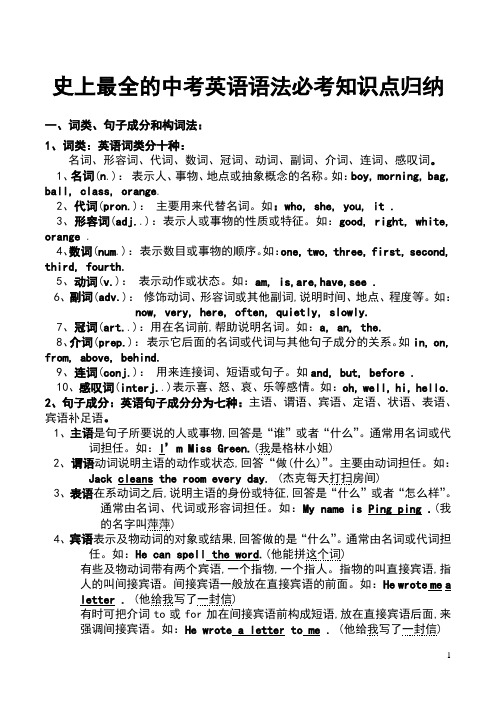
史上最全的中考英语语法必考知识点归纳一、词类、句子成分和构词法:1、词类:英语词类分十种:名词、形容词、代词、数词、冠词、动词、副词、介词、连词、感叹词。
1、名词(n.):表示人、事物、地点或抽象概念的名称。
如:boy, morning, bag, ball, class, orange.2、代词(pron.):主要用来代替名词。
如:who, she, you, it .3、形容词(adj..):表示人或事物的性质或特征。
如:good, right, white, orange .4、数词(num.):表示数目或事物的顺序。
如:one, two, three, first, second, third, fourth.5、动词(v.):表示动作或状态。
如:am, is,are,have,see .6、副词(adv.):修饰动词、形容词或其他副词,说明时间、地点、程度等。
如:now, very, here, often, quietly, slowly.7、冠词(art..):用在名词前,帮助说明名词。
如:a, an, the.8、介词(prep.):表示它后面的名词或代词与其他句子成分的关系。
如in, on, from, above, behind.9、连词(conj.):用来连接词、短语或句子。
如and, but, before .10、感叹词(interj..)表示喜、怒、哀、乐等感情。
如:oh, well, hi, hello.2、句子成分:英语句子成分分为七种:主语、谓语、宾语、定语、状语、表语、宾语补足语。
1、主语是句子所要说的人或事物,回答是“谁”或者“什么”。
通常用名词或代词担任。
如:I’m Miss Green.(我是格林小姐)2、谓语动词说明主语的动作或状态,回答“做(什么)”。
主要由动词担任。
如:Jack cleans the room every day. (杰克每天打扫房间)3、表语在系动词之后,说明主语的身份或特征,回答是“什么”或者“怎么样”。
史上最全的中考英语语法必考知识点归纳
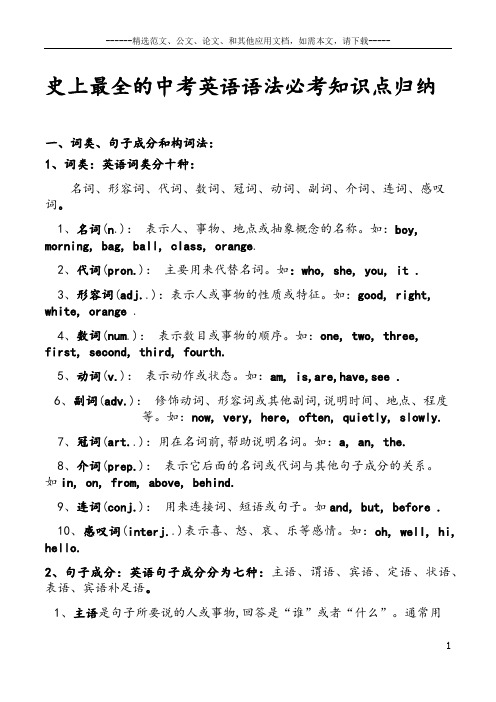
史上最全的中考英语语法必考知识点归纳一、词类、句子成分和构词法:1、词类:英语词类分十种:名词、形容词、代词、数词、冠词、动词、副词、介词、连词、感叹词。
1、名词(n.):表示人、事物、地点或抽象概念的名称。
如:boy, morning, bag, ball, class, orange.2、代词(pron.):主要用来代替名词。
如:who, she, you, it .3、形容词(adj..):表示人或事物的性质或特征。
如:good, right, white, orange .4、数词(num.):表示数目或事物的顺序。
如:one, two, three, first, second, third, fourth.5、动词(v.):表示动作或状态。
如:am, is,are,have,see .6、副词(adv.):修饰动词、形容词或其他副词,说明时间、地点、程度等。
如:now, very, here, often, quietly, slowly.7、冠词(art..):用在名词前,帮助说明名词。
如:a, an, the.8、介词(prep.):表示它后面的名词或代词与其他句子成分的关系。
如in, on, from, above, behind.9、连词(conj.):用来连接词、短语或句子。
如and, but, before .10、感叹词(interj..)表示喜、怒、哀、乐等感情。
如:oh, well, hi, hello.2、句子成分:英语句子成分分为七种:主语、谓语、宾语、定语、状语、表语、宾语补足语。
1、主语是句子所要说的人或事物,回答是“谁”或者“什么”。
通常用名词或代词担任。
如:I’m Miss Green.(我是格林小姐)2、谓语动词说明主语的动作或状态,回答“做(什么)”。
主要由动词担任。
如:Jack cleans the room every day. (杰克每天打扫房间)3、表语在系动词之后,说明主语的身份或特征,回答是“什么”或者“怎么样”。
中考英语常考的动词短语归纳
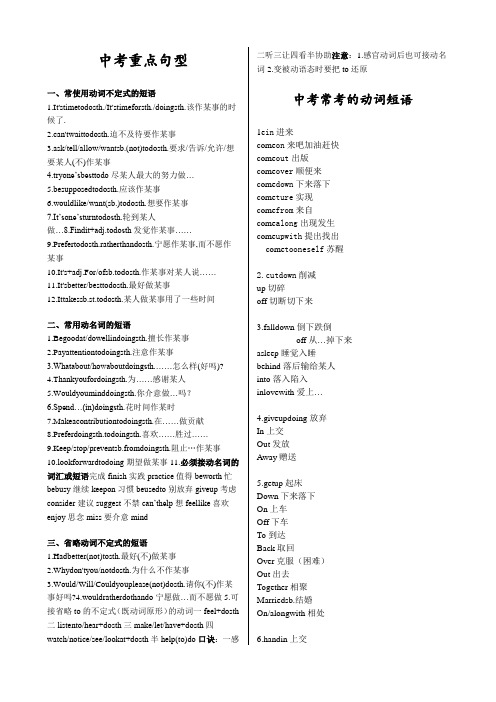
中考重点句型一、常使用动词不定式的短语1.It'stimetodosth./It'stimeforsth./doingsth.该作某事的时候了.2.can'twaittodosth.迫不及待要作某事3.ask/tell/allow/wantsb.(not)todosth.要求/告诉/允许/想要某人(不)作某事4.tryone’sbesttodo尽某人最大的努力做…5.besupposedtodosth.应该作某事6.wouldlike/want(sb.)todosth.想要作某事7.It’sone’sturntodosth.轮到某人做…8.Findit+adj.todosth发觉作某事……9.Prefertodosth.ratherthandosth.宁愿作某事,而不愿作某事10.It's+adj.For/ofsb.todosth.作某事对某人说……11.It'sbetter/besttodosth.最好做某事12.Ittakessb.st.todosth.某人做某事用了一些时间二、常用动名词的短语1.Begoodat/dowellindoingsth.擅长作某事2.Payattentiontodoingsth.注意作某事3.Whatabout/howaboutdoingsth.……怎么样(好吗)?4.Thankyoufordoingsth.为……感谢某人5.Wouldyouminddoingsth.你介意做…吗?6.Spend…(in)doingsth.花时间作某时7.Makeacontributiontodoingsth.在……做贡献8.Preferdoingsth.todoingsth.喜欢……胜过……9.Keep/stop/preventsb.fromdoingsth.阻止…作某事10.lookforwardtodoing期望做某事11.必须接动名词的词汇或短语完成finish实践practice值得beworth忙bebusy继续keepon习惯beusedto别放弃giveup考虑consider建议suggest不禁can’thelp想feellike喜欢enjoy思念miss要介意mind三、省略动词不定式的短语1.Hadbetter(not)tosth.最好(不)做某事2.Whydon'tyou/notdosth.为什么不作某事3.Would/Will/Couldyouplease(not)dosth.请你(不)作某事好吗?4.wouldratherdothando宁愿做…而不愿做5.可接省略to的不定式(既动词原形)的动词一feel+dosth 二listento/hear+dosth三make/let/have+dosth四watch/notice/see/lookat+dosth半help(to)do口诀:一感二听三让四看半协助注意:1.感官动词后也可接动名词2.变被动语态时要把to还原中考常考的动词短语1e in进来come on来吧加油赶快come out出版come over顺便来come down下来落下come ture实现come from来自come along出现发生come upwith提出找出come tooneself苏醒2.cutdown削减up切碎off切断切下来3.falldown倒下跌倒off从…掉下来asleep睡觉入睡behind落后输给某人into落入陷入inlovewith爱上…4.giveupdoing放弃In上交Out发放Away赠送5.getup起床Down下来落下On上车Off下车To到达Back取回Over克服(困难)Out出去Together相聚Marriedsb.结婚On/alongwith相处6.handin上交Out发放分发Up举手Shakehands握手7.gohome回家Back回去Out外出Over仔细检查Bad变质Off发出响声Wrong(机器)出故障Tobed入睡Ondoing/todo继续Forawalk散步8.havealookat/aswim/arest看/游泳/休息acold/acough/aheadache/afever/atoothache/astomachache患感冒/咳嗽/头疼/发烧/牙疼/胃疼Trouble/difficulties/problems/fundoing做…有麻烦/困难/问题/愉快agood/greattime过得愉快9.lookat看一看After照顾Like长得像For寻找Out小心over仔细检查up查阅through浏览forwardtodoing盼望期望10.makesure确信Faces做鬼脸Mistakes(amistake)犯错误Anoise吵闹Adecision做决定Aliving谋生Thebed整理床铺Phonecalls打Upone’smind下决心Friendswithsb.交朋友Sb.Feelathome感到宾至如归Roomfor给…腾出地方11.setoff出发动身启程Up建立One’smindtodo一心想做12.doone’sbest尽最大努力One’shomework做作业Wellin擅长Thechore做家务Thedishes洗餐具Exercises做运动13.puton穿上Off推迟Up粘贴举起Out扑灭Away把…收好Down写下记下14.takeoff脱下飞机起飞Out取出Away拿走After长得像Place发生Turns轮流Notes记笔记Photos照相Partin参加Pridein对…感到满意Careof照顾15.thinkabout考虑of想起over仔细考虑up想到想出16.hearof(间接)听说About听到…详情From收到…的来信17.writedown写下Back(tosb.)写回信Sb.Sth.(sth.Tosb.)给…写信18.turnup调大音量Down调小音量On打开Off关闭Over把…翻过来19.upput~粘贴Set~建立Fix~修理Clean~清扫干净Cheer~使…兴奋起来Turn~调大音量Get~起床Cut~切碎Grow~长大成长Hand~举手Look~查阅Make~组成化妆Wake~醒来Stay~熬夜Pick~捡起来Ring/call~打Send~发放把…往上送Open~开业End~结束告终Hurry~赶快Show~出席露面Use~用尽20.outcome~出版Keep~(使)在外Put~扑灭Look~小心Work~算出制定出Wear~把…穿旧Try~试验尝试Take~取出Rush~冲出去Go~外出到外面Find~找出查出Sell~售完Clean~清除Run~用完Hang~withsb.闲逛Give~分发Hand~分发21.overlook~仔细检查Turn~把…翻过来Go~仔细检查Come~顺便过来Get~克服(困难)22.awaytake~拿走Put~放好Give~赠送Run~流失Drive~驱散Far~远离Right~立即马上23.offtake~脱下飞机起飞Put~推迟Fall~掉下Turn~关闭Set~出发动身启程Get~下来Drop~放下下车Show~炫耀Run~跑掉Drive~赶走Cut~切断Break~突然中止中断Go~发出响声Be~离开24.downlet~使…失望Put~写下记下Write~写下Turn~调小音量Sit~坐下Cut~削减Fall~倒下跌倒Pull~推翻Get~下来Break~出故障Keep~使缓和25.atpoint~指向指示Look~看Laugh~嘲笑Knock~敲(门、窗等)Call~拜访某地~present当前~first首先~theendof在…最后~beginningof在…起初~theageof在…岁时~sametime同时~Once立即马上~themoment此刻~least至少~most至多~last最后终于26.onturn~打开Try~试穿Put~穿戴Pass~传递Live~靠…谋生Knock~敲Hold~等一等Go~继续Keep~doing继续Get~上车Carry~坚持下去Come~加油Later~稍后Call~拜访某人Work~从事忙于Depend~决定于Concentrate~全神贯注27.forwait~等待Thanks~感谢Pay~支付Look~寻找Ask~请求询问Send~派人去请Leave~前往Care~关心关怀Call~要求As~至于28.culture(1)middleschool中学(2)talkshow谈话节目(3)theGreatWall长城(4)thePalaceMuseum故宫(5)Tian’anMenSquare(6)baseballcap棒球帽(7)sportsshoes运动鞋(8)Children’sPalace少年宫(9)SouthAmerica南美洲(10)theWorldCup世界杯(11)SpringFestival春节(12)beachvolleyball沙滩排球(13)TVshow电视节目(14)policestation警察局(15)shopassistant店员(16)payphone公用(17)postoffice邮局(18)theUnitedStates美国(19)theUnitedKingdom英国(20)trainstation火车站(21)WorldTradeCenter世界贸易中心(22)nationalflag国旗(23)tablemanners餐桌礼仪29.常用动词短语:(1)befullof充满Befilledwith用…充满(2)begoodat=dowellindoing擅长做begood(bad)for对…有益(有害)begood(bad)tosb.对…好(坏)(3)belatefor迟到(4)becoveredwith被…覆盖(5)beafraid/terrifiedtodo/fordoing害怕做…(6)bebusydoingsth./withsth.忙于做…(7)bemadeof/fromsth.由…制作而成bemadeinspl.在…生产或制造(8)bepleasedwith对…感到满意bepleasedtodo乐意做…(9)beangrywithsb.生某人的气beangryatsth.因某事生气(10)befamousforsth.因….而出名befamousassb.作为…而出名(11)对做…感兴趣beinterestedindoing takeaninterestin(12)为某人/某事担忧beworriedaboutsb./sth.worryaboutsb./sth.(13)beexcitedabout对…感到兴奋(14)besurprisedatsth./sb.对…感到惊讶besurprisedtodosth.对做…感到惊讶(15)benervousofsth.有点害怕benervousabout/atsth.因某事不安(16)bepatientwith对…有耐心beimpatientat/for对…不够耐心(17)beusedtodo/fordoing被用来做…beusedtodoing习惯做…usedtodo过去常常做…(18)besatisfiedat对…满意besatisfiedwith满意于(19)bestricton/insth.对…严格bestrictwithsb.对某人严格(20)适合于…befitfor/besuitablefor(21)beanxiousfor急于做…(22)beeagerfor渴望做…(23)bereadyfordoing/todo准备做…(24)bedifferentfrom不同于bethesameas相同(25)beproudof/betheprideof骄傲takeprideindoing因…而感动自豪(26)betiredfrom因…而疲倦(27)compare…to…把…比作…compare…with…把…和…做比较(28)complainabout/of抱怨(29)helpsb.Withdoing/todo协助做helponeselftosth.随便吃withone’shelp在…的协助下(30)给某人提供某物providesb.withsth./sth.forsb.offersb.sth./sth.tosb.(31)stoptodo停止做另一件事stopdoing停止做正做的事stopsth.fromdoing阻止做(32)forgettodo忘记去做另一件事forgetdoing忘记做过的事(33)remembertodo记得去做另一件事rememberdoing记得做过的事(34)regrettodo后悔去做regretdoing后悔做过(35)agreeto(idea/advice/plan…)同意计划/建议等agreewithsb.同意某人的观点agreeon关于…达成一致30.其他常用短语:(1)attimes=sometimes有时(2)ontime准时(3)intime即时(4)allthetime一直(5)indanger危险(6)outofdanger脱离危险(7)inhunger饥饿(8)introuble困难(9)instyle时髦(10)outofstyle不时髦(11)inpublic公众(12)onthephone用交谈(13)onthehand(在)一方面(14)ontheotherhand(在)另一方面(15)firstofall首先(16)inorderto为了(17)becauseof因为(18)insteadof代替(19)bytheway顺便说一下(20)intheway挡道(21)more…than比…多(22)fallasleep入睡(23)bymistake错误地(24)byaccident/chance偶然地意外地(25)toone’ssurprise令人惊奇的是(26)eventhough/evenif即使1)allkindsof各种各样的2)allovertheworld/thecountry全世界/全国3)allover遍及每一部分,浑身4)allone'slife一生5)oneafteranother顺次6)theChildren'sPalace少年宫7)dayafterday日复一日8)upanddown上上下下9)thedayaftertomorrow后天10)thedaybeforeyesterday前天11)thelast/pasttwoyears(orso)最近两年(左右)12)thewholecountry/thewholeworld全国/全世界13)amomentago刚刚14)justnow/then刚刚/那时15)halfanhour'swalk步行半小时的路程16)lateon过后,后来17)onebyone一个接一个18)manykindsof很多种类的19)manydifferentkindsof很多不同种类的20)inorderto为了……起见;以便量词词组1)abit一点儿2)afew(of)一些(可数),几个…3)alittle一些(不可数)4)alotof(lotsof)很多5)apieceof一张(一片,块)6)acupof一茶怀7)aglassof一玻璃杯8)apileof一堆pilesandpilesof一堆堆的9)aboxof一盒10)acopyof一份,一本11)abowlof一碗12)abasketof一篮13)aplateof一盘14)abottleof一瓶15)abasinof一脸盆16)asetof一套17)akindof一种18)atype/ind一种类型的19)agreatdealof非常多,大量的(不可数名词)20)alarge(great)numberof非常多,大量(可数名词)21)agreatmany大量,很多(可数名词)22)adifferenttypeof一种不同型号的23)agroupof一队,一组,一群。
2019中考英语语法必考知识点归纳
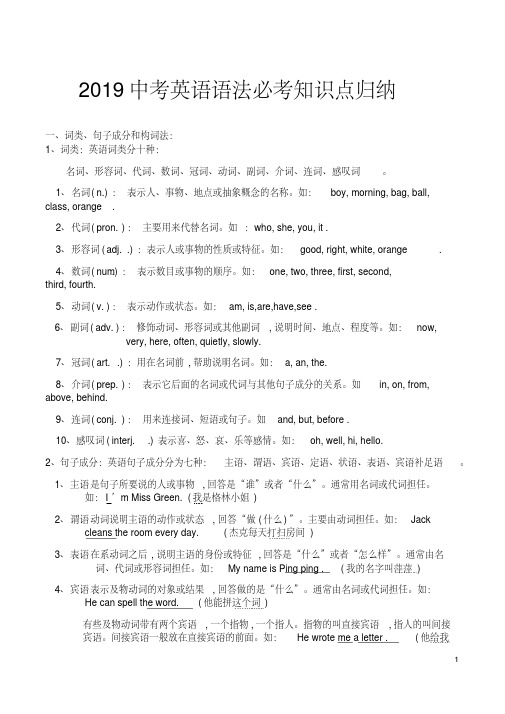
2019中考英语语法必考知识点归纳一、词类、句子成分和构词法:1、词类:英语词类分十种:名词、形容词、代词、数词、冠词、动词、副词、介词、连词、感叹词。
1、名词(n.):表示人、事物、地点或抽象概念的名称。
如:boy, morning, bag, ball,class, orange.2、代词(pron.):主要用来代替名词。
如:who, she, you, it .3、形容词(adj..):表示人或事物的性质或特征。
如:good, right, white, orange .4、数词(num.):表示数目或事物的顺序。
如:one, two, three, first, second,third, fourth.5、动词(v.):表示动作或状态。
如:am, is,are,have,see .6、副词(adv.):修饰动词、形容词或其他副词,说明时间、地点、程度等。
如:now,very, here, often, quietly, slowly.7、冠词(art..):用在名词前,帮助说明名词。
如:a, an, the.8、介词(prep.):表示它后面的名词或代词与其他句子成分的关系。
如in, on, from, above, behind.9、连词(conj.):用来连接词、短语或句子。
如and, but, before .10、感叹词(interj..)表示喜、怒、哀、乐等感情。
如:oh, well, hi, hello.2、句子成分:英语句子成分分为七种:主语、谓语、宾语、定语、状语、表语、宾语补足语。
1、主语是句子所要说的人或事物,回答是“谁”或者“什么”。
通常用名词或代词担任。
如:I’m Miss Green.(我是格林小姐)2、谓语动词说明主语的动作或状态,回答“做(什么)”。
主要由动词担任。
如:Jackcleans the room every day. (杰克每天打扫房间)3、表语在系动词之后,说明主语的身份或特征,回答是“什么”或者“怎么样”。
中考英语语法知识总结(全)

初中英语语法一.名词I. 名词的种类:专有名词普通名词可数名词不可数名词国名地名人名,团体机构名称个体名词集体名词抽象名词物质名词II. 名词的数:1. 规则名词的复数形式:名词的复数形式,一般在单数形式后面加-s 或-es 。
现将构成方法与读音规则列表如下:规则例词1 一般情况在词尾加-s map-maps, sea-seas, girl-girls, day-daysclass-classes, box-boxes, watch-watches,2 以s, x, ch, sh 结尾的名词后加-esdish-dishesleaf-leaves, thief-thieves, knife-knives, 以-f 或变-f 和-fe 为v 再加-eswife-wives, half-halves3 -fe 结尾的词加-s chief-chiefs, proof-proofs, roof-roofs以辅音字母加y 结尾的名词,变y 为party-parties, family-families,4i 加-es story-stories, city-cities以元音字母加y 结尾的名词,或专有toy-toys, boy-boys, day-days, ray-rays,5名词以y 结尾的,加-s Henry-Henrys6 以辅音一般加-es Negro-Negroes, hero-heroes,字母加potato-potatoes, tomato-tomatoes-o 结尾piano-pianos, photo-photos, auto-autos,不少外来词加-s的名词kilo-kilos, solo-soloszero-zeros/zeroes, volcano-volcanoes/两者皆可volcanos7 以元音字母加-o 结尾的名词加-s radio-radios, bamboo-bamboos, zoo-zoostruth-truths, mouth-mouths, month-months, 8 以-th 结尾的名词加-spath-paths,2. 不规则名词复数:英语里有些名词的复数形式是不规则的,现归纳如下:规则例词man-men, woman-women, foot-feet,1 改变名词中的元音字母或其他形式goose-geese, mouse-mice2 单复数相同sheep, deer, means, works, fish, yuan, jin,3 只有复数形式trousers, clothes, thanks, goods, glasses,4 一些集体名词总是用作复数people, policeclass, family, crowd, couple, group, 部分集体名词既可以作单数(整体)5 government, population, team, public,也可以作复数(成员)partycustoms( 海关), times( 时代), spirits( 情绪), drinks( 饮料), sands( 沙滩), papers( 文6 复数形式表示特别含义件报纸), looks( 外表), brains( 头脑智力),greens( 青菜)7 表示加-s Americans, Australians, Germans, Greeks,“某国Swedes, Europeans人”单复数同形Swiss, Portuguese, Chinese, Japanese以-man 或-woman结尾的改为Englishmen, Frenchwomen-men,-womensons-in-law, lookers-on, passers-by,将主体名词变为复数story-tellers, boy friends合成名8无主体名词时将最后一部分词grown-ups, housewives, stopwatches变为复数将两部分变为复数women singers, men servantsIII. 名词的所有格:名词在句中表示所有关系的语法形式叫做名词所有格。
中考英语知识归纳复习专题 句子的种类 外研版-外研版初中九年级全册英语试题

句子的种类【句子的种类】简单句通常只由一个主语(或并列主语)和一个谓语(或并列谓语)构成,按句子功能一般分为陈述句、疑问句、祈使句、感叹句。
【简单句的基本句型】【考点训练1】1.My younger brother is smart and I have already taught ________ (he) some English.2.The orange tastes ______ (good/well).3.Loud music always makes me _____ (want) to dance.答案:him good want【陈述句】注意:否定句是在be动词、助动词或情态动词后加not,常用缩略形式,要注意人称、时态的一致。
【考点训练2】1.I woke up early in the morning.(改为否定句)I ____________ up early in the morning.2.Carrots are grown all over the world.(改为否定句)Carrots ______________all over the world.3.They have gone to Africa.(改为否定句)They __________________ to Africa.答案:didn’t wake aren’t grown haven’t gone【疑问句】◆常见疑问词(组)及其用法常用来询问交通方式;答语中出现by+v.ing时,一般用how来提问。
【考点训练3】1.—____ you ever ____ to Shanghai?—Yes,I went there last year. ()A.Are;goingB.Do;goC.Did;goD.Have;been2.—___ are you going to England?—To visit my uncle.He lives there with his family.()3.—Do you like listening to country music or rock music?—____.It brings me pleasure. ()A.Yes,I doB.No,I don’tC.I like musicD.Country music4.David never fights with his classmates,____? ()’t he’t he答案:DCDA祈使句祈使句表示请求、命令、劝告、叮嘱、号召、建议等。
初中三年英语语法知识归纳最全的中考英语语法大全汇总
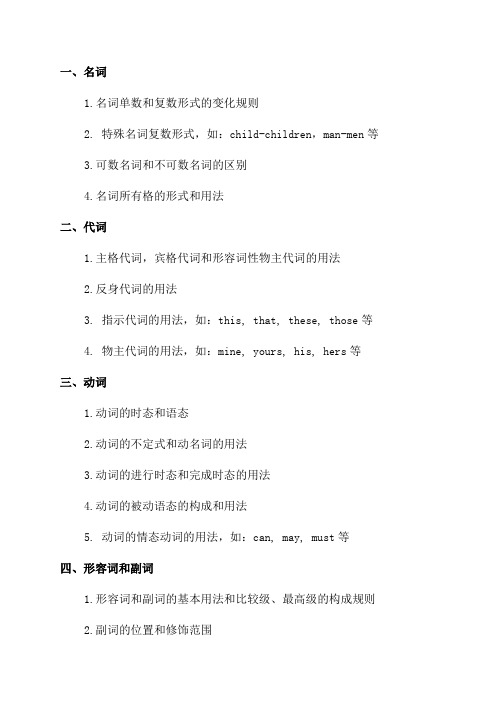
一、名词1.名词单数和复数形式的变化规则2. 特殊名词复数形式,如:child-children,man-men等3.可数名词和不可数名词的区别4.名词所有格的形式和用法二、代词1.主格代词,宾格代词和形容词性物主代词的用法2.反身代词的用法3. 指示代词的用法,如:this, that, these, those等4. 物主代词的用法,如:mine, yours, his, hers等三、动词1.动词的时态和语态2.动词的不定式和动名词的用法3.动词的进行时态和完成时态的用法4.动词的被动语态的构成和用法5. 动词的情态动词的用法,如:can, may, must等四、形容词和副词1.形容词和副词的基本用法和比较级、最高级的构成规则2.副词的位置和修饰范围3. 常见的形容词和副词的用法,如:good, well, bad, badly等五、冠词和介词1.不定冠词和定冠词的用法2.冠词与名词的搭配3.介词的基本用法和常见的介词短语4.常见的介词短语的固定搭配和习惯用法六、从句和状语从句1.定语从句和名词性从句的引导词和用法2.时间状语从句、条件状语从句和目的状语从句的引导词和用法3.原因状语从句和结果状语从句的引导词和用法七、倒装和虚拟语气1.部分倒装和完全倒装的情况和用法2.虚拟语气的用法,包括虚拟条件句和虚拟语气在主句中的表达方式八、陈述句、疑问句和祈使句1.简单陈述句和陈述句的否定形式2.一般疑问句和特殊疑问句的句型和用法3.祈使句的用法和变化形式以上只是初中英语语法知识的一部分,还有许多其他的语法知识点,如条件句、比较结构、间接引语等。
如果你需要进一步的复习材料,可以查阅相关的英语语法书籍或教材,或者向老师寻求帮助。
初中英语短语、词组及重点句型归纳
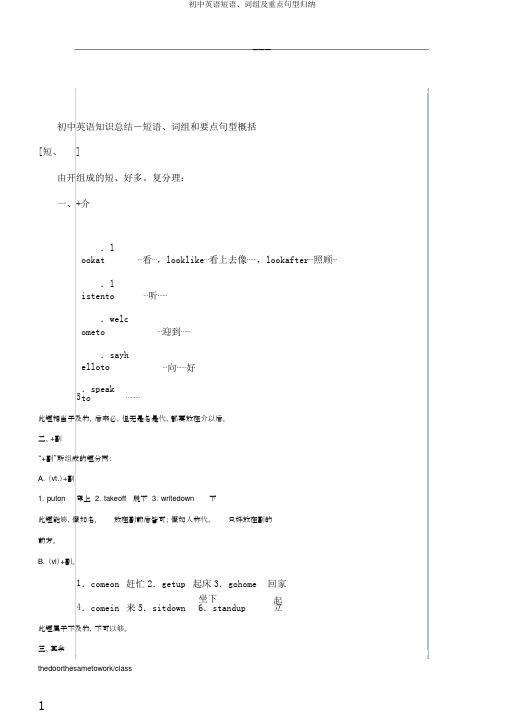
---初中英语知识总结-短语、词组和要点句型概括[短、]由开组成的短、好多。
复分理:一、+介.lookat⋯看⋯,looklike⋯看上去像⋯⋯,lookafter⋯照顾⋯.listento⋯听⋯⋯.welcometo⋯迎到⋯⋯.sayhelloto⋯向⋯⋯好5.speakto⋯⋯⋯此短相当于及物,后来必,但无是名是代,都要放在介以后。
二、+副“+副”所组成的短分两:A.(vt.)+副1.puton穿上2.takeoff脱下3.writedown下此短能够,假如名,放在副前后皆可;假如人称代,只好放在副的前方。
B.(vi)+副。
1.comeon赶忙2.getup起床3.gohome回家4.comein来5.sitdown 坐下6.standup起立此短属于不及物,不可以够。
illalook/seatsupperyoungshoppingTV/games-----10.playgames[介短聚焦]“介+名/代”所组成的短称介短。
将Unitsl-16常用的介短按用法行。
1.in+言/色/衣帽等,表示使用某种言或衣着⋯⋯。
2.in+Row/Team/Class/Grade等,表示“在⋯⋯排//班/年”等。
3.inthemorning/afternoon/evening/表示“在上午/下午/夜晚”等一段。
4.inthedesk/pencil-box/bedroom等表示“在桌/笔盒/寝室里”。
5.inthetree表示“在上(非自己全部)”;onthetree表示“在上(自己全部)”。
6.inthewall表示“在上(凹陷去)”;onthewall表示“在上(指的表面)”。
7.atwork(在工作)/atschool(上学)/athome(在家)注意此短中无the。
8.at+刻表示点。
9.likethis/that表示方式,意“像⋯⋯/那”。
10.of短表示所属关系。
11.behind/beside/near/under+名等,表示方向、所。
中考英语语法知识:常考副词用法归纳(5)

初中英语语法知识:常考副词用法归纳(5)一、副词presently的用法小议1.表示“不久”,有两种用法值得注意:(1) 若是用于过去时态,表示“不久以后”“不一会儿”,此时它通常是放在句首。
如:Presently,I fell asleep.不一会儿,我就睡着了。
Presently I heard her leave the house.不一会儿我听到她离开了房间。
(2) 若是用于将来时态,表示“马上”“很快”,此时它通常是放在句末。
如:He'l1 be here presently. 他马上就到这里。
The doctor will be here presently.医生马上就到。
有时单独使用:A:Mummy, can I have an ice-cream?妈妈,我能吃一块冰凌淋吗?B:Presently dear.过一会儿,乖乖。
2.表示“现在”“此刻”“眼下”,多用于美国英语,此时它通常放在所修饰的动词、形容词或名词之前:These are the courses presently available. 这些就是现有的课程。
He's presently working on this problem.他目前正在研究这个问题。
There is presently no cure for the disease.目前这种病无药可医。
在这样用时,通常不宜把它放在句首或句尾;遇此情况可改用at present。
如:They're on holiday at present.目前他们在度假。
At present we are living in Richmond.现在我们住在里其曼区。
二、副词badly的用法小说明1.基本义为“不好”“坏”“差”“糟糕”等;另外,它还可表示“迫切地”“非常”,但此主要与want. need.be in need of等表示“相要”或“需要”的动词或短语连用。
广州中考英语必考语法

广州中考英语必考语法【一】中考语法考查必考语法点之一:被动语态考查形式:语选,完形,完成句子题型出现,尤其是完成句子。
考察难度:考查的动词都是比较简单、拼写不会超过5个字母的单词,过去分词一般都是直接+ed出现,出题不难,要求掌握被动语态的判断、被动语态的结构和动词过去分词的正确拼写。
要点归纳:1、主语不能发出对应的动作(主语是没有生命的东西,一定是被动语态。
主语是人,从意识上去判断该动作是不是该主语发出的)2、结构:be+过去分词+(by+动作执行者)3、掌握的几种形式:一般现在时的被动语态:am/is/are/+动词的过去分词(v-ed)+(by+动作执行者)一般过去时的被动语态:was/were+动词的过去分词(v-ed)+(by+动作执行者)现在完成时的被动语态:have/has+动词的过去分词(v-ed)+(by+动作执行者)一般将来时的被动语态:be going to/ will +动词的过去分词(v-ed)+(by+动作执行者)含有情态动词的被动语态:can/could/should/must+动词的过去分词(v-ed)+(by+动作执行者)3、感官动词或使役动词使用省略to的不定式,主动语态中不带to,但变为被动语态时,须加上to Feel, hear, listen to, let, have, make, see, watch observe, notice, look at, help例:make sb do sth = sb +be+made + to do sth4、被动语态常考的固定搭配:Be made of Be made from Be made in Be used for Be used to do注意下列短语和动词有“被动形式”,但没有被动的意思:be used to doing (习惯于做事) Used to do sth (过去/曾经做某事)Be made up of (由……成) Be well-known for (众所周知)5、无被动语态的不及物动词常考的有:happen, take place, begin, start, end, belong to, come true.7、主动表被动的动词:sell, wash, write, 和五个起来:feel, smell, look, taste, sounde.g.: The pen writes well. He looks strong.例题一:1.……George 11 that Grandma used to be a gentle lady, ……(2019年真题)A. tellB. toldC. was toldD. has told2.……When it was time for the villagers____8______to market, they were greatly surprised to find that the man’s potatoes____9____perfectly into three groups.(2019年真题)9.A. are divided B. were divided C. are dividing D. Divided3.……they were greatly surprised to find that the man’s potatoes were____9____perfectly into three groups.(2019年真题)9.A. divide B divided C. are dividing D. divides例题二:在中国人民的帮助下,肯尼亚在几个月前建成了一条新的现代化铁路。
中考英语常考语法有哪些初中英语语法重点归纳
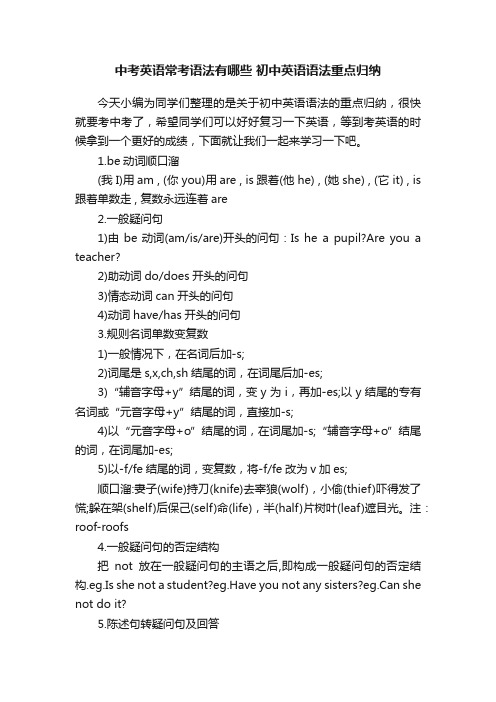
中考英语常考语法有哪些初中英语语法重点归纳今天小编为同学们整理的是关于初中英语语法的重点归纳,很快就要考中考了,希望同学们可以好好复习一下英语,等到考英语的时候拿到一个更好的成绩,下面就让我们一起来学习一下吧。
1.be动词顺口溜(我 I)用am , (你 you)用are , is跟着(他 he) , (她 she) , (它 it) , is 跟着单数走 , 复数永远连着are2.一般疑问句1)由be动词(am/is/are)开头的问句:Is he a pupil?Are you a teacher?2)助动词do/does开头的问句3)情态动词can开头的问句4)动词have/has开头的问句3.规则名词单数变复数1)一般情况下,在名词后加-s;2)词尾是s,x,ch,sh结尾的词,在词尾后加-es;3)“辅音字母+y”结尾的词,变y为i,再加-es;以y结尾的专有名词或“元音字母+y”结尾的词,直接加-s;4)以“元音字母+o”结尾的词,在词尾加-s;“辅音字母+o”结尾的词,在词尾加-es;5)以-f/fe结尾的词,变复数,将-f/fe改为v加es;顺口溜:妻子(wife)持刀(knife)去宰狼(wolf),小偷(thief)吓得发了慌;躲在架(shelf)后保己(self)命(life),半(half)片树叶(leaf)遮目光。
注:roof-roofs4.一般疑问句的否定结构把not放在一般疑问句的主语之后,即构成一般疑问句的否定结构.eg.Is she not a student?eg.Have you not any sisters?eg.Can she not do it?5.陈述句转疑问句及回答This is a watch.-àIs this a watch?Yes,it is(不许缩写).No,it isn’t(必须缩写).6.陈述句变否定句This is a watch.→This is not(isn’t) a watch.7.主要字母组合的发音8.几个发音特殊的辅音字母A.字母c在 a,l,o,r,u 等前读[k] , 如come [k ʌm],coat [k əut] 等.字母c在 e,I,y 前读[s] , 如 pencil [pensl] 等.B.字母g一般读[g] , 如go [gəu] , leg [leg]等,字母g和e(即ge)在词尾读 [dʒ] , 如orange [ɔrindʒ]等C.双写辅音字母虽然是两个相同的辅音字母写在一起,但只读一个音,如apple[æ pl]egg[eg]等。
初中英语语法知识点总结及练习
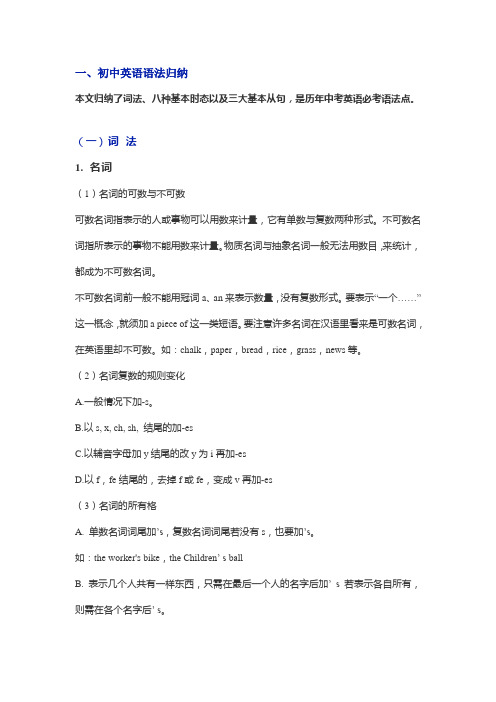
一、初中英语语法归纳本文归纳了词法、八种基本时态以及三大基本从句,是历年中考英语必考语法点。
(一)词法1. 名词(1)名词的可数与不可数可数名词指表示的人或事物可以用数来计量,它有单数与复数两种形式。
不可数名词指所表示的事物不能用数来计量。
物质名词与抽象名词一般无法用数目,来统计,都成为不可数名词。
不可数名词前一般不能用冠词a、an来表示数量,没有复数形式。
要表示“一个……”这一概念,就须加a piece of这一类短语。
要注意许多名词在汉语里看来是可数名词,在英语里却不可数。
如:chalk,paper,bread,rice,grass,news等。
(2)名词复数的规则变化A.一般情况下加-s。
B.以s, x, ch, sh, 结尾的加-esC.以辅音字母加y结尾的改y为i再加-esD.以f,fe结尾的,去掉f或fe,变成v再加-es(3)名词的所有格A. 单数名词词尾加’s,复数名词词尾若没有s,也要加’s。
如:the worker's bike,the Children’ s ballB. 表示几个人共有一样东西,只需在最后一个人的名字后加’ s若表示各自所有,则需在各个名字后’ s。
如:This is Lucy and Licy’ s room.These are Kate's and jack’ s rooms.C. 如果是通过在词尾加—s构成的复数形式的名词,只加’。
如:the students’ books,the girls’ blouses(另外:名词+of+名词名词是有生命的,我们就用’s结构来表示所有关系。
如果名词所表示的事物是无生命的,我们就要用名词+of+名词的结构来表示所有关系。
) 2. 代词人称代词,物主代词,反身代词,指示代词,不定代词(1)人称代词第一人称单数I me my mine myself复数 we us our ours ourselves第二人称单数 you you your yours yourself复数 you you your yours yourselves第三人称单数 he him his his himselfshe her her hers herselfit it its its itself复数 they them their theirs themselves(2)物主代词物主代词的用法:形容词性物主代词后面一定要跟上一个名词;名词性物主代词可作主语、表语、宾语。
2023年中考英语语法精讲:4类介词短语用法归纳
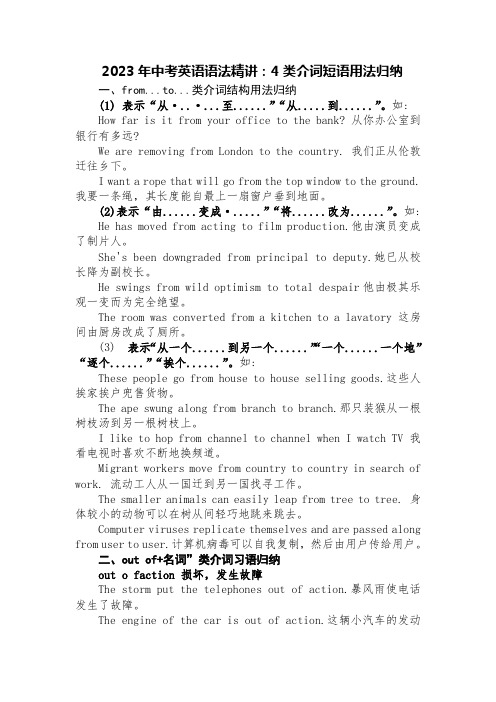
2023年中考英语语法精讲:4类介词短语用法归纳一、from...to...类介词结构用法归纳(1) 表示“从·..·...至......”“从.....到......”。
如:How far is it from your office to the bank? 从你办公室到银行有多远?We are removing from London to the country. 我们正从伦敦迁往乡下。
I want a rope that will go from the top window to the ground.我要一条绳,其长度能自最上一扇窗户垂到地面。
(2)表示“由......变成·.....”“将......改为......”。
如:He has moved from acting to film production.他由演员变成了制片人。
She's been downgraded from principal to deputy.她已从校长降为副校长。
He swings from wild optimism to total despair他由极其乐观一变而为完全绝望。
The room was converted from a kitchen to a lavatory 这房间由厨房改成了厕所。
(3)表示“从一个......到另一个......”“一个......一个地”“逐个......”“挨个......”。
如:These people go from house to house selling goods.这些人挨家挨户兜售货物。
The ape swung along from branch to branch.那只装猴从一根树枝汤到另一根树枝上。
I like to hop from channel to channel when I watch TV 我看电视时喜欢不断地换频道。
中考英语知识点归纳

中考英语知识点归纳(经典版)编制人:__________________审核人:__________________审批人:__________________编制单位:__________________编制时间:____年____月____日序言下载提示:该文档是本店铺精心编制而成的,希望大家下载后,能够帮助大家解决实际问题。
文档下载后可定制修改,请根据实际需要进行调整和使用,谢谢!并且,本店铺为大家提供各种类型的经典范文,如工作报告、工作计划、活动方案、规章制度、演讲致辞、合同协议、条据文书、教学资料、作文大全、其他范文等等,想了解不同范文格式和写法,敬请关注!Download tips: This document is carefully compiled by this editor. I hope that after you download it, it can help you solve practical problems. The document can be customized and modified after downloading, please adjust and use it according to actual needs, thank you!Moreover, our store provides various types of classic sample essays, such as work reports, work plans, activity plans, rules and regulations, speeches, contract agreements, documentary evidence, teaching materials, complete essays, and other sample essays. If you would like to learn about different sample formats and writing methods, please pay attention!中考英语知识点归纳其实,在初中阶段中,很多人想要了解初中英语有哪些重要的知识点,中考英语中必背的重点英语知识有哪些呢?以下是本店铺为大家带来的2024年中考英语知识点归纳,欢迎参阅呀!2024年中考英语知识点归纳1 (see 、hear 、notice 、find 、feel 、listen to 、look at1 (感官动词)+do eg:I like watching monkeys jump2 (比较级 and 比较级)表示越来越怎么样3 a piece of cake=easy 小菜一碟(容易)4 agree with sb 赞成某人5 all kinds of 各种各样 a kind of 一样6 all over the world= the whole world 整个世界7 along with同。
中考英语常见副词形容词比较级最高级单词归纳总结

中考英语常见副词形容词比较级最高级单词归纳总结一、目录1.中考英语常见副词形容词比较级最高级单词归纳总结2.不规则变化词比较级最高级3.特殊用法比较级最高级4.常用句型总结5.易混淆词汇辨析6.语法考点解析二、中考英语常见副词形容词比较级最高级单词归纳总结1.副词比较级最高级:more,most;less,least;fairly,quite;hardly,scarcely;again,once more;fast,faster,fastest;early,earlier,earliest;high,higher,highest;late,later,latest;near,nearer,nearest等。
2.形容词比较级最高级:big,bigger,biggest;small,smaller,smallest;hot,hotter,hottest;red,redder,reddest;beautiful,more beautiful,most beautiful等。
3.不规则变化词比较级最高级:good,better,best;badly,worse,worst;many,more,most等。
4.特殊用法比较级最高级:as...as中间用形容词或副词原级;the+比较级+ofthe two/in the pair表示两者中比较...的一个;the+序数词+比较级表示第几...等。
三、常用句型总结1.The+比较级...,the+比较级...越...越...2.比较级+than+any other+单数名词/any of+复数名词/any+单数名词表示最高级的含义。
3.比较级+than+the other+单数名词/the other+复数名词表示比较级的含义。
4.比较级+than+同一主语的其他动词表示比较级的含义。
5.The+比较级+主语+谓语表示比较级的特殊用法。
四、易混淆词汇辨析1.more和many的区别:more修饰可数名词复数或不可数名词,表示更多;many修饰可数名词复数。
中考英语it的常考句型及知识点归纳(附练习题)
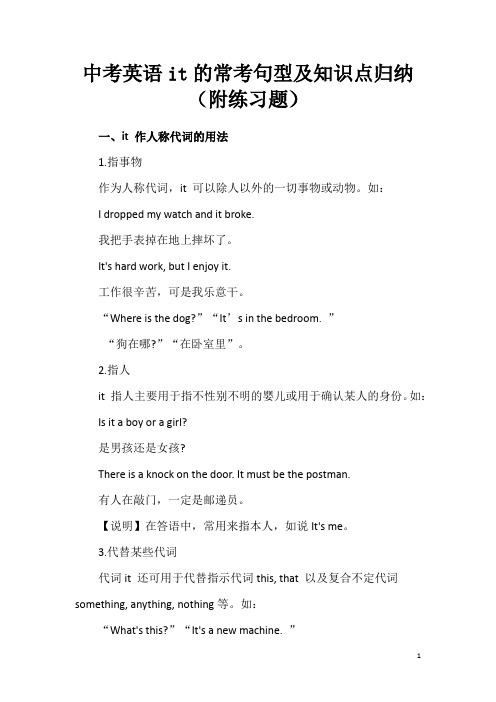
中考英语it的常考句型及知识点归纳(附练习题)一、it 作人称代词的用法1.指事物作为人称代词,it 可以除人以外的一切事物或动物。
如:I dropped my watch and it broke.我把手表掉在地上摔坏了。
It's hard work, but I enjoy it.工作很辛苦,可是我乐意干。
“Where is the dog?”“It’s in the bedroom. ”“狗在哪?”“在卧室里”。
2.指人it 指人主要用于指不性别不明的婴儿或用于确认某人的身份。
如:Is it a boy or a girl?是男孩还是女孩?There is a knock on the door. It must be the postman.有人在敲门,一定是邮递员。
【说明】在答语中,常用来指本人,如说It's me。
3.代替某些代词代词it 还可用于代替指示代词this, that 以及复合不定代词something, anything, nothing等。
如:“What's this?”“It's a new machine. ”“这是什么?”“是一种新机器”。
Nothing is wrong, is it?没出什么问题,是吗?二、it 作非人称代词的用法1.基本用法it 作非人称代词的用法,主要用于指时间、距离、价值、天气、气候及温度等自然现象。
如:It's too late to go there now.现在去那儿已经太迟了。
It rained all day yesterday.昨天下了一天的雨。
It can get very hot here.这里有时会很热。
2.用于某些句型It's time for sth.该做某事了。
It's time to do sth.该做某事的时候了。
It's time for sb to do sth.某人该干某事了。
- 1、下载文档前请自行甄别文档内容的完整性,平台不提供额外的编辑、内容补充、找答案等附加服务。
- 2、"仅部分预览"的文档,不可在线预览部分如存在完整性等问题,可反馈申请退款(可完整预览的文档不适用该条件!)。
- 3、如文档侵犯您的权益,请联系客服反馈,我们会尽快为您处理(人工客服工作时间:9:00-18:30)。
中考英语重点语法全归纳:4种常考句型To learn a foreign language is not easy.
It is not easy to learn a foreign language.
( 2)作宾语
They began to read.
( 3)作宾语补足语
Jim asked me to help him with his lessons.
We often heard her sing.
( 4)作定语
I have an important meeting to attend.
( 5)作状语
She went to see her grandma yesterday.
( 6)用在how, when, where, what, which等之后
I don t know how to use a computer.
Do you know when to start?
He didn t know what to do next.
种类
(1)陈述句 ( 肯定式和否定式)
(2)疑问句 ( 一般疑问句、特殊疑问句、选择疑问句、反意疑问句)
(3)祈使句 ( 肯定式和否定式)
(4)感叹句
句子成份
1)主语
Betty likes her new bike.
He gets up early every day.
To learn a foreign language is not easy.
2)谓语
We work hard.
The boy caught a bird.
He is my brother.
They all look fine.
3)表语
Her sister is a nurse.
It s me. I m ready.
He got angry.
We were at home last night.
His cup is broken.
4)宾语
Tom bought a story-book.
I saw him yesterday.
He wanted to have a cup of tea.
5)直接宾语和间接宾语
He gave me some ink.
Our teacher told us an interesting story.
6)宾语补足语
Call her Xiao Li.
You must keep the room clean.
John asked me to help him.
7)定语
This is a green jeep.
This is an apple tree.
Are these students your classmates?
Winter is the coldest season of the year.
I have something to tell you.
8)状语
You are quite right.
She will arrive in Beijing on Monday.
He stopped to have a look.
简单句的五种基本句型
第一种主语+连系动词+表语 ( S+V+P)
The bike is new.
The map is on the wall.
第二种主语+不及物动词 ( S+V)
He swims.
第三种主语+及物动词+宾语 ( S+V+O)
Children often sing this song.
第四种主语+及物动词+间接宾语+直接宾语 ( S+V+IO+DO) She showed her friends all her pictures.
第五种主语+及物动词+宾语+宾语补足语 ( S+V+O+C)
We keep our classroom clean and tidy.
并列句
He likes maths, but he needs help.
I help him and he helps me.
1.复合句
宾语从句
He said ( that) he felt sick.
I don t know whether ( if) she still works in the factory. I take back what I said.
I can t tell who is there.
Can you tell me where the Summer Palace is?
状语从句
The train had left when I got to the station.
I ll go with you to the cinema this afternoon if I m free.
The students went to the farm because the farmers needed some help. The earth is bigger than the moon.He was so tired that he couldn t walk on.
定语从句
Find the girl who is wearing a red skirt.
Show me the picture that you like best.。
